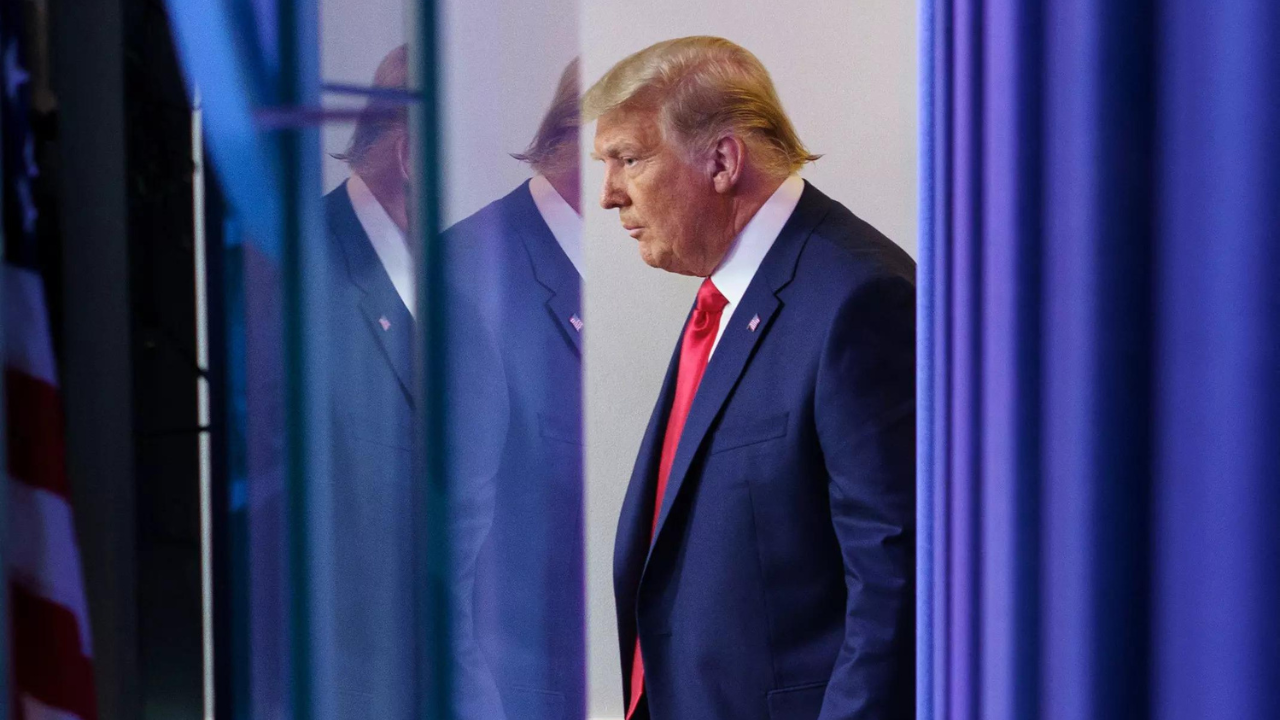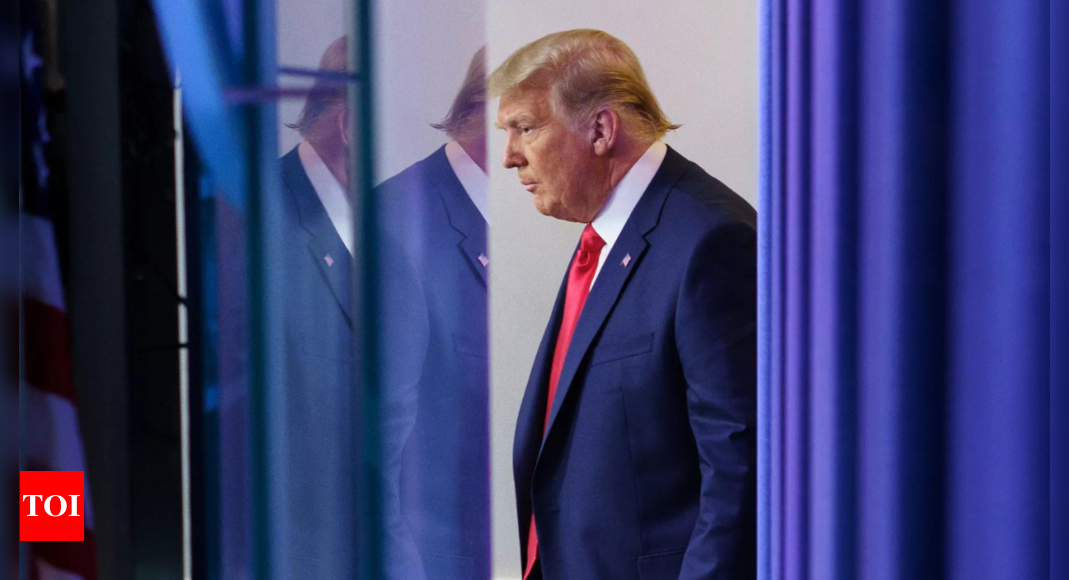
NEW YORK: Donald Trump’s two adult sons are expected to begin taking the witness stand this week in the civil trial for financial fraud that threatens to deal a heavy blow to his business empire.
If all goes according to the court schedule, Trump’s eldest son, Donald Trump Jr, 45, will take the stand on Wednesday, followed on Thursday his younger brother Eric Trump, 39.
Both are executive vice presidents of the Trump Organization, a sprawling network of companies managing residential and office skyscrapers, luxury hotels and golf courses around the world.
New York state attorney general Letitia James accuses the brothers — and their father — of fraudulently inflating the value of the group’s assets by billions of dollars to obtain more favorable bank loans and insurance deals.
If the trial advances on schedule, 77-year-old Donald Trump Sr will be questioned next Monday, a day shy of one year before the November 5, 2024 presidential election that he hopes will sweep him back into the White House.
Ivanka Trump, who left the Trump Organization in 2017 to join the White House as an advisor to her father, will follow two days later. She is not the target of the lawsuits.
– Fines –
Long associated with the family business, Donald Trump Jr and Eric Trump took control when their father entered the White House. They fervidly support their father, displaying loyalty on a daily basis in the media and on social networks.
They are unlikely to deviate from the line taken by the family defense attorneys since the trial began a month ago.
The lawyers assert that the group’s assets, such as Trump Tower or the building at 40 Wall Street, had no objective value and that subjective valuations were sincere, and that banks did not lose any money by lending to the Trump Organization.
For his part, Trump rails without evidence against a “rigged” trial conducted by a “corrupt” state attorney and a “rogue” judge, Arthur Engoron, in the pay of Democrats to prevent him from returning to the White House.
Regularly attending the hearings, Trump often holds mini press conferences in crowded court hallways, posing as the victim of judicial plotting, as in the four other cases in which he is criminally indicted, notably for attempting to overturn the 2020 presidential election.
In several cases, judges have issued gag orders barring him from attacking court staff or witnesses. In New York, Judge Engoron fined him $5,000 and $10,000 for violating the order and attacking his clerk. Both fines have since been paid in full.
Trump’s attendance at the hearings is a sign of the stakes in the case. While conviction carries no jail term, the trial could result in Trump losing control of part of his real estate holdings, facing a $250 million fine and a ban on managing companies in New York state.
Even before the trial opened on October 2, Judge Engoron found that the prosecution presented “conclusive evidence that between 2014 and 2021, the defendants overstated assets” by “$812 million (to) $2.2 billion,” depending on the year.
As a result of “repeated fraud,” he ordered the liquidation of the companies, a veritable judicial bombshell, but his decision was suspended on appeal.
The trial still must determine if other violations of financial laws occurred and what fine should be imposed.
If all goes according to the court schedule, Trump’s eldest son, Donald Trump Jr, 45, will take the stand on Wednesday, followed on Thursday his younger brother Eric Trump, 39.
Both are executive vice presidents of the Trump Organization, a sprawling network of companies managing residential and office skyscrapers, luxury hotels and golf courses around the world.
New York state attorney general Letitia James accuses the brothers — and their father — of fraudulently inflating the value of the group’s assets by billions of dollars to obtain more favorable bank loans and insurance deals.
If the trial advances on schedule, 77-year-old Donald Trump Sr will be questioned next Monday, a day shy of one year before the November 5, 2024 presidential election that he hopes will sweep him back into the White House.
Ivanka Trump, who left the Trump Organization in 2017 to join the White House as an advisor to her father, will follow two days later. She is not the target of the lawsuits.
– Fines –
Long associated with the family business, Donald Trump Jr and Eric Trump took control when their father entered the White House. They fervidly support their father, displaying loyalty on a daily basis in the media and on social networks.
They are unlikely to deviate from the line taken by the family defense attorneys since the trial began a month ago.
The lawyers assert that the group’s assets, such as Trump Tower or the building at 40 Wall Street, had no objective value and that subjective valuations were sincere, and that banks did not lose any money by lending to the Trump Organization.
For his part, Trump rails without evidence against a “rigged” trial conducted by a “corrupt” state attorney and a “rogue” judge, Arthur Engoron, in the pay of Democrats to prevent him from returning to the White House.
Regularly attending the hearings, Trump often holds mini press conferences in crowded court hallways, posing as the victim of judicial plotting, as in the four other cases in which he is criminally indicted, notably for attempting to overturn the 2020 presidential election.
In several cases, judges have issued gag orders barring him from attacking court staff or witnesses. In New York, Judge Engoron fined him $5,000 and $10,000 for violating the order and attacking his clerk. Both fines have since been paid in full.
Trump’s attendance at the hearings is a sign of the stakes in the case. While conviction carries no jail term, the trial could result in Trump losing control of part of his real estate holdings, facing a $250 million fine and a ban on managing companies in New York state.
Even before the trial opened on October 2, Judge Engoron found that the prosecution presented “conclusive evidence that between 2014 and 2021, the defendants overstated assets” by “$812 million (to) $2.2 billion,” depending on the year.
As a result of “repeated fraud,” he ordered the liquidation of the companies, a veritable judicial bombshell, but his decision was suspended on appeal.
The trial still must determine if other violations of financial laws occurred and what fine should be imposed.
Source link

